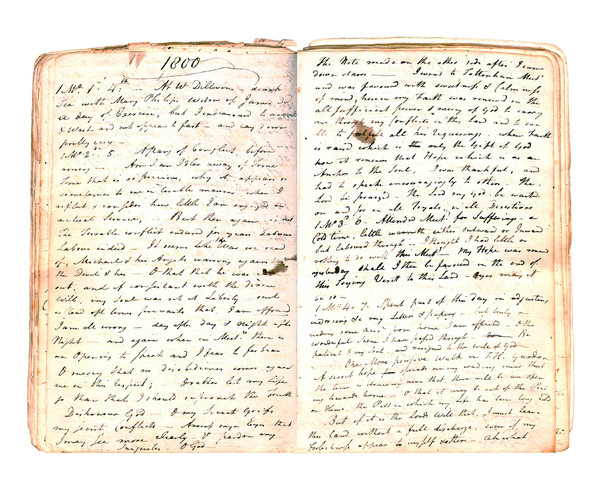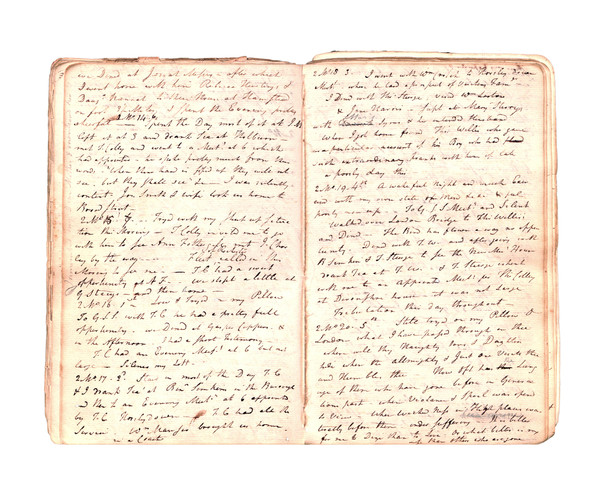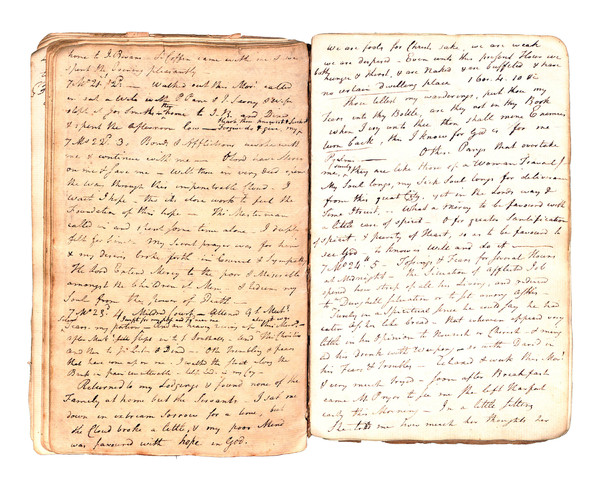Biblical Language
Scattergood often quotes passages from the Bible in his journals and letters, literally embedding biblical text in his writing. At the same time, biblical language is also incorporated into Scattergood's documents in more subtle ways, through word choice and allusion. The language of the Bible guides the style and tone in which Scattergood writes, yet in doing so Scattergood reinscribes and reaffirms his own speech--including moments when his words diverge from biblical text. Passages from the Bible are taken from their original context and used to advise, give courage, and support Scattergood during the peaceful and trying times of his life. Comparing himself to figures such as Jonah, Jacob, and Job, he is often concerned with maintaining a subservient and supplicating tone with respect to his spiritual standing and humanity. As Sarah Crabtree notes in A Holy Nation, "Friends compared their distress to the anguish of the ancient Hebrews and reassured themselves that they too endured these hardships on behalf of God" (Crabtree 46).
Scattergood's writing reveals a self-consciousness towards God and proper religious ideology; he uses Biblical language, layering his words with Christian signifiers, and writing becomes for him an act of piety. In his entry from 1/2/1800, Scattergood compares his long labour to the "terrible conflict" between the Archangel Michael and the Devil and his followers. In the chapter Revelations, Michael defeats the Devil, who is thrown down into the Earth. The Book of Revelations is primarily about Judgement Day and the clashing of good and evil. His comparison to this book reveals the extreme seriousness and urgency with which Scattergood views his mission in England. He then goes on to describe his insecurity in his mission--how can he be certain he is following the will of God, particularly when he feels a "cloud" often come over him.
In the beginning of the entry dated 2/20/1800, Scattergood suggests that the "Haughty Sons and Daughters" of London will have nowhere to hide when the "Allmighty & Just One" comes. While this allusion may be less direct than the passage specifically referencing the Angel Michael, it pertains to the destruction and upheaval of Judgment Day all the same. Scattergood also writes that "Violence & Spoil... [and] Wickedness" were much more apparent to those from past generations. Though good and evil may at times be hidden, as Scattergood suggests, the unlikelihood that the haughty Londoners can hide from God in turn implies that nothing is concealed from Him. This contrast is one that Scattergood struggles with daily; he worships an all-knowing God yet he rarely seems to feel certain in his worship.
Scattergood often describes himself as a prisoner in his journals from abroad, attributing this to the sense that the way is not "open" to him. It would seem however that he is also trapped to some measure by the constraints of biblical language and Quaker beliefs, he is compelled to abide by a language that perhaps at times is more of a limitation of expression than an aid.
While Scattergood's journals allow for some introspection, it is only ostensibly so. He records feeling low, being at peace, etc., but these expressions are to an extent formulaic. They imitate the structures of language and interpretation of meanings found in the Bible and also that were being standardized by the Quaker community. As Scattergood attempts to record his spiritual progress, he confines and "resigns" himself to his spiritual leading. This practice was encouraged by the Quaker faith, which seeks to accept rather than what would be seen as manufacturing divine will. The biblical figure of Job is rewarded after remaining passive and praising God despite the destruction done to his property, family, and his own body. As Scattergood resigns himself to the divine will, he settles into a prefigured disposition, which becomes an assurance of his own spirituality.


